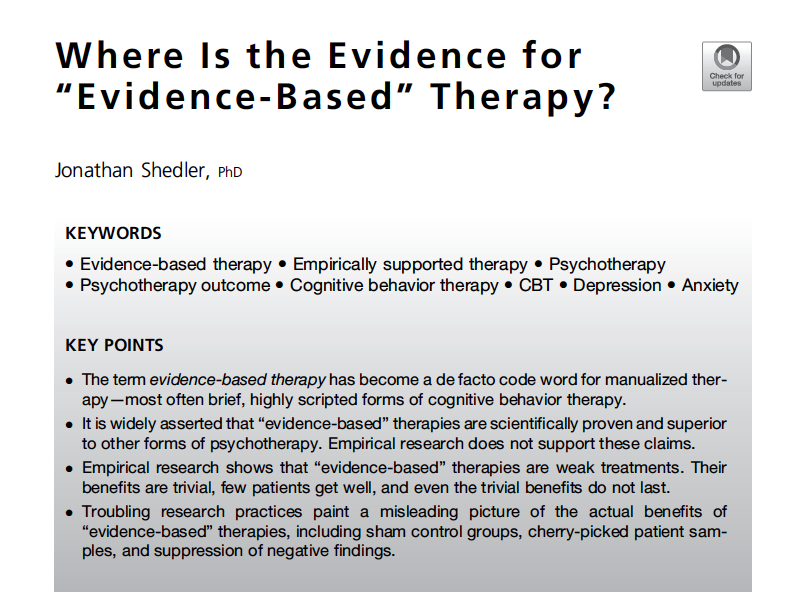What does it mean...
-when only requirement for calling therapy "evidence-based" is a significant p-value?
-and a researcher can nearly always get a significant p-value just by using a control group that doesn& #39;t get legitimate psychotherapy?
Welcome to "evidence based therapy."
-when only requirement for calling therapy "evidence-based" is a significant p-value?
-and a researcher can nearly always get a significant p-value just by using a control group that doesn& #39;t get legitimate psychotherapy?
Welcome to "evidence based therapy."
2/ Yes, that& #39;s exactly how it& #39;s done. I& #39;m not joking. I& #39;m serious. That& #39;s the sleight of hand.
Now you& #39;ve seen the man behind the curtain.
More details here:
https://jonathanshedler.com/wp-content/uploads/2018/05/Shedler-2018-Where-is-the-evidence-for-evidence-based-therapy.pdf">https://jonathanshedler.com/wp-conten...
Now you& #39;ve seen the man behind the curtain.
More details here:
https://jonathanshedler.com/wp-content/uploads/2018/05/Shedler-2018-Where-is-the-evidence-for-evidence-based-therapy.pdf">https://jonathanshedler.com/wp-conten...
3/ It would be so incredible easy to have a meaningful control group. Just choose a random sample of licensed mental health professionals.
Assign the patients in the control group to be treated by real clinicians in their practices and pay for the treatments.
Now researchers can
Assign the patients in the control group to be treated by real clinicians in their practices and pay for the treatments.
Now researchers can
4/ ask and answer a meaningful question:
Is the so-called "evidence-based" treatment any better than the treatment an average clinician provides in their therapy practices? If yes, then it may be a legit scientific advance. If no, then it isn& #39;t.
Pretty simple, isn& #39;t it?
Is the so-called "evidence-based" treatment any better than the treatment an average clinician provides in their therapy practices? If yes, then it may be a legit scientific advance. If no, then it isn& #39;t.
Pretty simple, isn& #39;t it?
5/ But no "evidence-based" therapy researcher has ever done this, or anything at all like it.
You know why? Because everyone has a pretty good idea what the results would show. They& #39;d show that "evidence based" therapies do *not* outperform plain old normal therapy. There would
You know why? Because everyone has a pretty good idea what the results would show. They& #39;d show that "evidence based" therapies do *not* outperform plain old normal therapy. There would
6/ be no justification for using the term "evidence based."
And that& #39;s why, in 40+ years of psychotherapy outcome research, this simple and obvious study has never been done. Not even once.
Because there are too many stakeholders who have a vested interest in continuing
And that& #39;s why, in 40+ years of psychotherapy outcome research, this simple and obvious study has never been done. Not even once.
Because there are too many stakeholders who have a vested interest in continuing
7/ to do things just exactly the way they& #39;ve been doing them. It leads to publications, grant funding, career advancement and prestige. It also provides cover for health insurance companies with a financial incentive to provide the briefest & cheapest treatments, whether they
8/ offer patients meaningful help or not.
Absolutely everyone benefits from the system. Except of course patients, and the practicing clinicians trying to help them.
But they don& #39;t provide grant funding or publish journal articles or make decisions about academic promotions.
Absolutely everyone benefits from the system. Except of course patients, and the practicing clinicians trying to help them.
But they don& #39;t provide grant funding or publish journal articles or make decisions about academic promotions.
9/ Pay no attention to the man behind the curtain.
10/ Oh yeah, I forgot: #CBTworks.
So long as you don’t ask too many questions about what “works” means.
So long as you don’t ask too many questions about what “works” means.

 Read on Twitter
Read on Twitter


